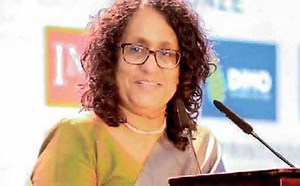
Women’s leadership gap hinders SL’s economic growth: Prime Minister
- CNL Reporter
- January 11, 2025
- Political
- Women’s leadership gap hinders SL’s economic growth: Prime Minister
- 0 Comments
Points out women continue to be underrepresented in sectors such as technology, finance and manufacturing industries
Says despite significant progress in education, presence of women in business leadership and decision-making positions remains disproportionately low
Cautions that excluding women from decision-making leads to policies, business models and practices that overlook their needs and potential
Stresses that Sri Lanka must adopt a more progressive discourse on gender relations to ensure inclusivity for women across all backgrounds
Sri Lanka must prioritise women’s participation in the business and decision-making roles as a strategic necessity for economic growth, Prime Minister Dr. Harini Amarasuriya said, asserting the need for greater gender inclusivity in the corporate sector.
Women continue to be underrepresented in sectors such as technology, finance and manufacturing, where they could make significant contributions if given the opportunity, highlighted Dr. Amarasuriya while addressing the recently held WCIC Prathibhabhisheka – Women Entrepreneur Awards 2024.
Despite the significant progress in education, as reflected in increasing university enrolment and higher academic attainment among women, their presence in the business leadership and decision-making positions remains disproportionately low. A 2019 report from the International Labour Organisation (ILO) found that only 12 percent of Sri Lankan women hold formal decision-making roles, a stark contrast to their educational achievements.
“We must reflect on the critical importance of ensuring women’s voices and perspectives in business and leadership. Their involvement is fundamental to driving inclusive economic growth and sustainable development, as they bring unique insights and solutions that can transform industries and communities alike,” Dr. Amarasuriya said.
She cautioned that excluding women from decision-making leads to policies, business models and practices that overlook their needs and potential. The absence of women in leadership often results in a lack of focus on critical issues such as flexible work arrangements, equal pay and workplace safety, which are challenges that disproportionately impact women.
Dr. Amarasuriya went on to stress that Sri Lanka must adopt a more progressive discourse on gender relations, to ensure inclusivity for women across all backgrounds, whether in urban centres or rural areas, corporate offices or political spaces, homes, schools and communities.
“It is a collective responsibility that requires consistent effort and commitment from the government, private sector and civil society to ensure that all women have the opportunity to thrive and be valued in wherever they are and whatever they do,” she said.
Recent research by the ILO indicates that women’s economic contribution in Sri Lanka has declined to approximately 30 percent in recent years. Dr. Amarasuriya pointed out that this figure primarily reflects paid labour, overlooking the substantial contributions of women through unpaid and care work. These responsibilities, often considered gendered roles, remain undervalued and underappreciated, she said.
“Even if women come from a certain class and have the privilege of assistance, the responsibility to ensure everything runs smoothly often still rests on them. The dual burden of these responsibilities places immense pressure on women, regardless of their class, caste, religion, geography or other factors,” she noted.
Women are still expected to balance careers with domestic responsibilities, creating an unrealistic double burden that often leads to stress, burnout and limited career advancement opportunities.
“This labour is largely invisible in the economy. The lack of affordable childcare, flexible work arrangements and societal norms that position women as primary caregivers further restrict their ability to participate fully in the workforce,” she said.
Dr. Amarasuriya reiterated the need for systemic changes to address these challenges, calling for targeted policies and workplace reforms to create an equitable environment, where women can contribute meaningfully to the economy.
DM

